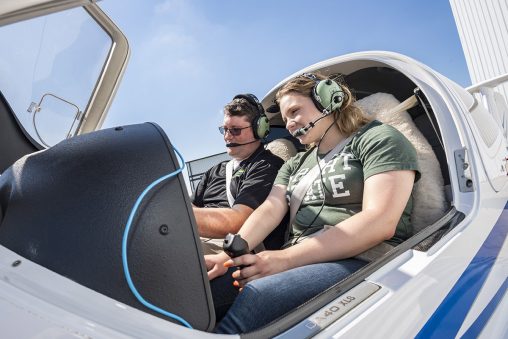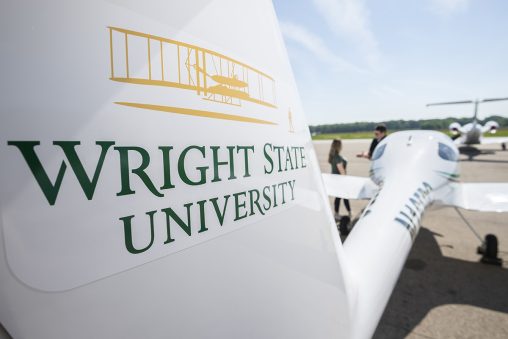There’s more good news on the aviation horizon for the Dayton area. Wright State University has officially launched its recently approved aviation programs.
Students can now prepare for careers as flight instructors or airline pilots through a new aviation degree at Wright State University. The program will also provide the training and skills needed for those who wish to pursue technical positions in the aviation industry.
Students can earn a Bachelor of Science in Aviation Science and Technology, an Associate of Applied Science in Aviation Science and Technology or a Minor in Aviation Studies through Wright State’s Department of Kinesiology and Health in the College of Health, Education and Human Services.
Wright State’s aviation degrees will appeal to students who have a strong desire to excel in aviation and acquire the skill sets of a commercial or professional pilot.
Students can learn more about the program by requesting information at wright.edu/aviation.
Students can enroll in Wright State’s new degree programs beginning in the fall of 2024. Students may apply with or without previous flight experience.
The new degrees have been approved by the Ohio Department of Higher Education and the Higher Learning Commission, the university’s accrediting body.
“Wright State is excited to build on our innovative roots and offer a comprehensive aviation degree program that gives our students the skills to pursue careers as pilots while supporting our region and Wright-Patterson Air Force Base,” said President Sue Edwards.
Wright State’s aviation courses will be offered in partnership with First Flight Aviation, a flight school at the Dayton-Wright Brothers Airport in Miamisburg.
First Flight Aviation is a Part 141 Federal Aviation Administration-approved flight school and holds one of the most comprehensive flight licenses in the industry.
The program provides students with a comprehensive educational experience, including preparing students to receive private pilot licenses and become Federal Aviation Administration-certified flight instructors.
“Wright State in partnership with First Flight has the reputation, expertise and resources to be a leader in aviation science in the region and beyond,” said Jim Denniston, Ph.D., dean of the College of Health, Education and Human Services.

Savannah Oakley plans to pursue a bachelor’s degree in aviation science and technology at Wright State. Wright State’s new Bachelor of Science in Aviation Science and Technology and Associate of Applied Science in Aviation Science and Technology will prepare students for careers as flight instructors, airline pilots and technical positions in the aviation industry. (Photos by Erin Pence)
Wright State initially partnered with First Flight in 2022 to offer students elective flight training courses.
One of those students is Savannah Oakley, who has already taken several aviation-related courses and plans to pursue a bachelor’s degree in aviation science and technology.
“I am excited to be in the first class to go through the program,” she said.
Oakley, who has wanted to get a private pilot license since she was 7, said she wants to pursue a career as a professional pilot. Because she wanted to go to college near her home in Kettering Oakley’s academic options initially seemed limited.
But when she learned that Wright State was launching an aviation program, she said, “It was like all of the pieces fell into place. I knew that this program was what I was supposed to do, and I couldn’t wait to get started.”
Wright State’s degree programs will help meet a national demand for pilots. The aviation industry in the United States is expected to experience a shortage of 130,000 pilots over the next 20 years.
“The industry need for pilots greatly exceeds the pipeline of students in existing aviation programs,” Denniston said. “The implementation of Wright State’s aviation science and technology programs will help address this critical workforce need and will provide our students with outstanding career opportunities after they complete their respective degree programs.”
Because demand for aviation degrees is growing, students at other Ohio universities are often placed on waitlists or must wait one or two years before they can fly a plane.
However, Wright State students who meet certain requirements will be able to fly a plane during their first semester in the aviation program.
Wright State’s 120-credit-hour bachelor’s degree in aviation science and technology will prepare students for advanced aviation careers that require training in multi-engine operations, aviation instruction, and aviation management.
Students in the bachelor’s degree program will also become certified flight instructors, allowing them to acquire more flight hours.
The 60-credit-hour associate degree will prepare students for entry-level careers flying single-engine planes, including law enforcement, corporate or charter operations, cargo and passenger airlines, survey pilots, and search and rescue operations.
Graduates of either degree program will need to accumulate 1,500 additional hours of flight time to earn an airline transport pilot’s license, which is required to fly as a captain or first officer for airlines and some other commercial aviation roles.

Wright State’s aviation courses will be offered in partnership with First Flight Aviation, a flight school at the Dayton-Wright Brothers Airport in Miamisburg.
The 16-credit hour aviation studies minor will prepare students for entry-level technical positions in the aviation industry.
“The Wright brothers were the first to fly, and now Wright State is continuing that tradition by teaching people to fly,” said Mick Phillips, chief flight instructor at First Flight Aviation and adjunct faculty member at Wright State.

 Walking through open doors
Walking through open doors  Adventures await
Adventures await  Wright State to expand nursing facilities to meet workforce needs and prepare more graduates for in-demand careers
Wright State to expand nursing facilities to meet workforce needs and prepare more graduates for in-demand careers  Wright State student-athletes make a lasting impact on local family with more to come
Wright State student-athletes make a lasting impact on local family with more to come  Wright State names Rajneesh Suri dean of Raj Soin College of Business
Wright State names Rajneesh Suri dean of Raj Soin College of Business 